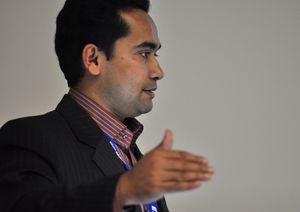Ataharul Chowdhury
Position: Lecturer at the University of the West Indies, St. Augustine and Adjunct Faculty at the University of Guelph in Canada

What was your biggest job challenge so far?
One of my biggest job challenges is to find a balance between the professional and personal sphere of life. In many organizations, this has become a challenge while we are having to manage with fewer and fewer resources for research and academic work. We have to work hard to keep up and compete on this rapidly emerging trend of scarce resources available for research and development, especially for those who are working in development studies. Relevant to this issue is also how to introduce and mobilize ideas while the existing regime is prone to a specific tradition towards development.
How did/do you use your acquired knowledge?
I returned to Bangladesh a couple of times after I graduated from BOKU in mid-2011. I have had opportunities to mobilize funds for continuing my work on video-mediated learning for capacity development of smallholders in Bangladesh. Recently, I have worked with FAO to develop a capacity development framework for strengthening agricultural innovation system. The framework is being piloted in eight countries in the tropical region, including Bangladesh. I have also worked at the University of Guelph, Ontario where I contributed to developing and implementing new research programs in areas of social media and information and communication technology (ICT) for agricultural development. At my current faculty position at the University of the West Indies I have had opportunities to contribute to ICT and agricultural development in the Caribbean.
How is the situation in your country now?
As my work is highly influenced by development theories and practices, when someone asks about Bangladesh I always focus on the development side. There are three main challenges for Bangladesh: institutional capacity, natural disasters, and political uncertainty. In the last decade Bangladesh has seen good progress in terms of growth and other social and economic dimensions of development. However, the ongoing debates and controversies over democratic practices have created a number of risks and uncertainty about institutions facilitating ‘social justice’, ‘human rights’, ‘education’, and ‘environment’.
